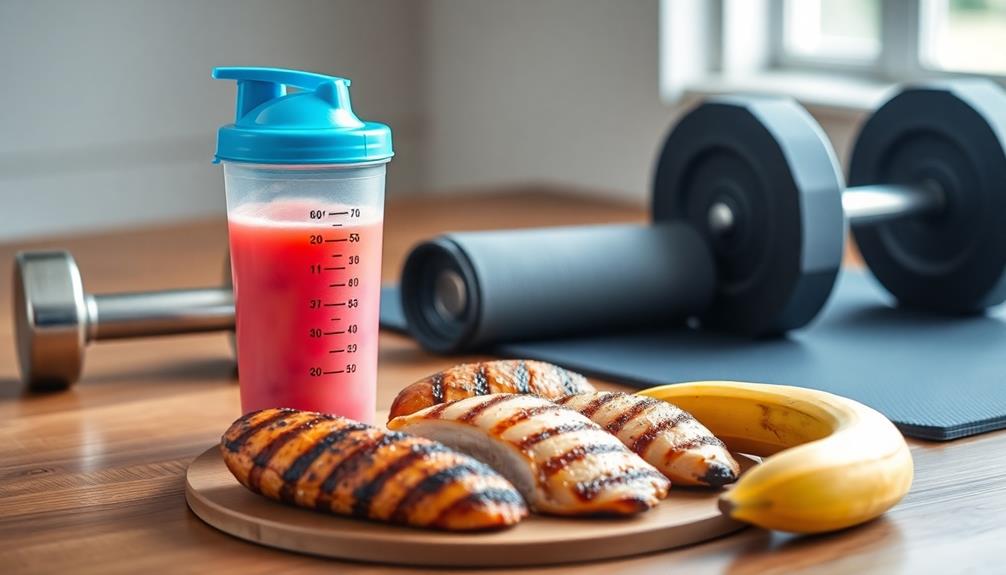After your workout, aim for a balanced intake of protein and carbohydrates to optimize muscle recovery and growth. Consume 15-30 grams of protein within 30 minutes post-exercise to provide essential building blocks for muscle repair. Pair this with carbohydrates to replenish depleted energy stores, aiming for a 2:1 or 3:1 carb-to-protein ratio. Timing is important, so try to eat within 2 hours of exercising. Adjust your intake based on your body size, workout intensity, and personal goals. Remember, proper post-workout nutrition can have a significant impact on your fitness progress. By fine-tuning your approach, you'll maximize the full potential of your training efforts.
Core Insight
- Consume 20-30 grams of protein within 30 minutes post-workout for optimal muscle recovery and growth.
- Aim for a 2:1 or 3:1 carb-to-protein ratio to replenish energy stores and support muscle repair.
- Eat a mix of protein and carbohydrates within 2 hours after exercising for best results.
- Adjust protein and carb intake based on workout intensity, body size, and individual goals.
- Choose easily digestible sources like whey protein, fruits, or white rice for quick nutrient absorption.
The Science of Muscle Recovery
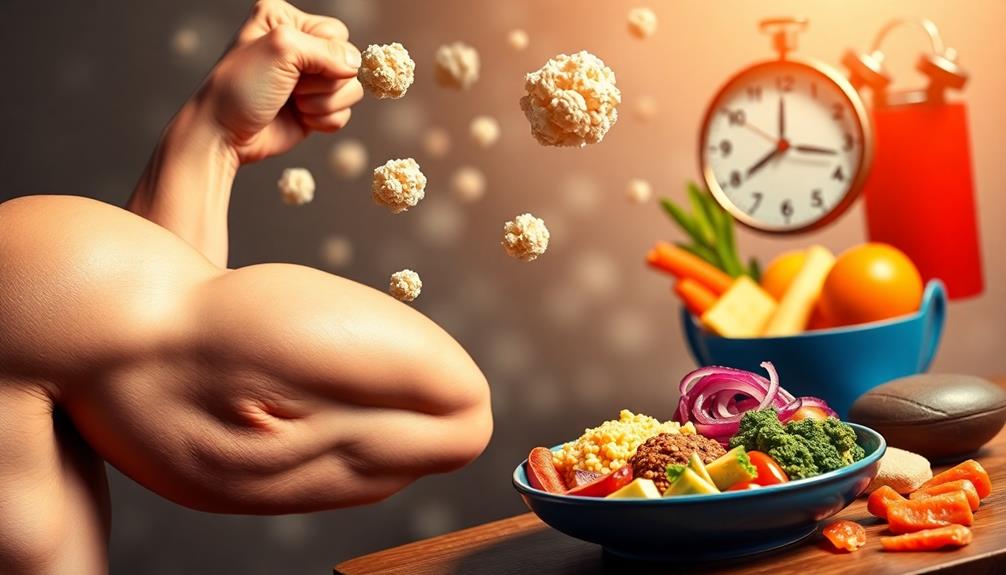
Intense workouts leave your muscles tired, but that's just the beginning of the recovery process. Exercise breaks down muscle fibers, uses up energy stores, and causes inflammation. After your workout, your body starts repairing the damage.
To rebuild stronger muscles, your body needs protein. Eating 15-30 grams of protein after your workout is perfect for most people. Athletes might need a bit more. Your muscles also need carbohydrates to restore energy levels and help deliver nutrients.
Hormones like insulin and growth hormone help repair tissues and adapt to the workout. Right after exercise, your body is ready to absorb nutrients. Eating the right mix of protein and carbs supports muscle recovery and prepares you for your next workout session.
Protein: Building Blocks for Muscles

Protein helps your muscles recover and grow. Exercise makes small tears in your muscles. Eating protein after a workout gives your body the building blocks it needs to repair these tears. This makes your muscles stronger. Whey protein powder is a good choice after exercise. It has 24-25 grams of protein per serving and your body absorbs it quickly.
Try to get 20-30 grams of protein within 30 minutes after your workout. Good sources are whey protein shakes, lean meats, eggs, or Greek yogurt. During this time, your body is best at using the protein to build muscle.
Carbohydrates: Replenishing Energy Stores
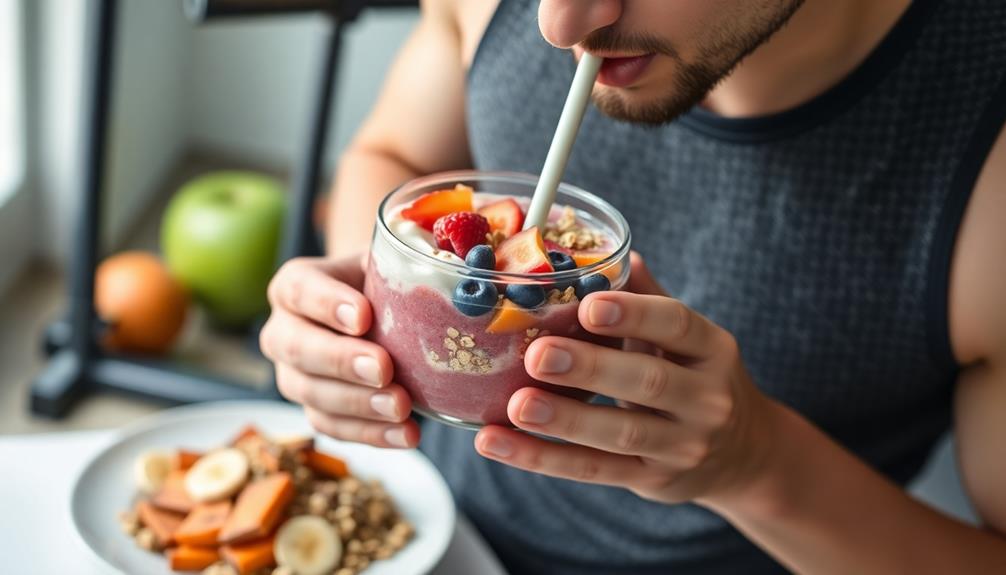
After a workout, it's important to replenish your body's energy stores. Carbohydrates are key for this. When you exercise, your body uses up its glycogen reserves. Glycogen fuels your muscles and keeps you performing well. Eating carbs after a workout refills these reserves. This helps you recover faster and gets you ready for your next workout. Adding hydration powders to your post-workout routine can also support proper hydration and recovery.
To get the most benefits from post-workout carbs:
- Choose carbs that your body absorbs quickly, like fruits, white rice, or sports drinks
- Eat 0.5-0.7 grams of carbs for each pound of your body weight
- Eat the carbs within 30 minutes after finishing your workout
Timing Your Post-Workout Nutrition
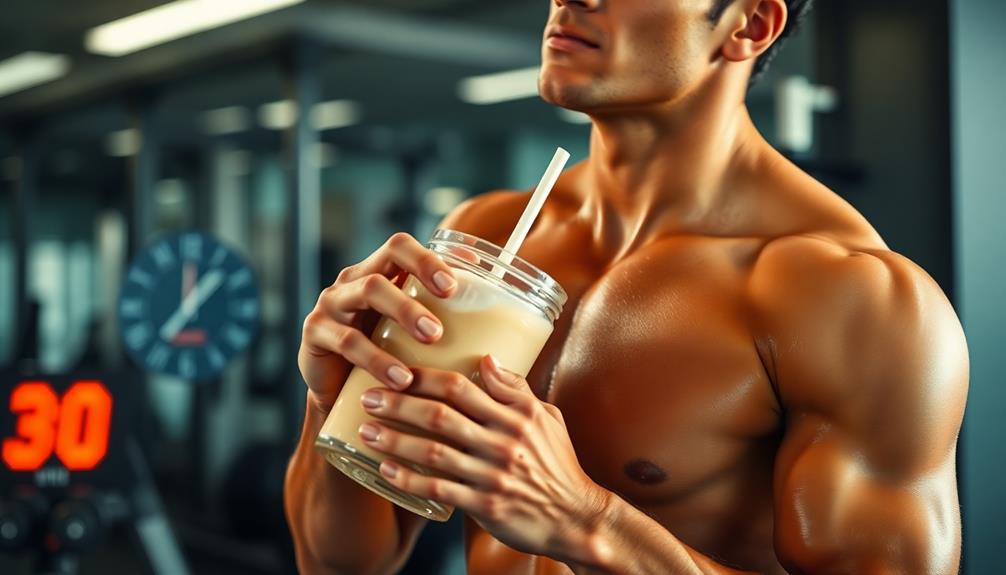
Eating after a workout is important for recovery and muscle growth. While the exact timing isn't as critical as once believed, especially if you ate before exercising, it's still best to eat within 2 hours of your workout.
The amount of protein and carbs you need depends on your workout:
- Strength training: Eat 20-30g of protein and 30-40g of carbs within an hour.
- Endurance exercise: Eat 15-25g of protein and 50-70g of carbs within 30 minutes.
- High-intensity interval training (HIIT): Eat 20-30g of protein and 40-60g of carbs within 45 minutes.
- Casual workouts: Eat 15-25g of protein and 20-30g of carbs within 2 hours.
Following these guidelines will help your body recover and build muscle after exercising. Adjust the amounts based on your body size and workout intensity.
Optimal Protein-to-Carb Ratios

Finding the right balance of protein and carbs after a workout is key for recovery. Most athletes should aim for a 2:1 or 3:1 ratio of carbs to protein. This helps restore energy and repair muscles. The ideal ratio depends on your goals, workout intensity, and body type.
For strength training, try 20-30g of protein and 40-60g of carbs post-workout. Endurance athletes may need more carbs, while those building muscle might up their protein. Adjust your intake based on how your body responds and recovers. Test different ratios to see what works best for you.
Liquid vs. Solid Nutrition
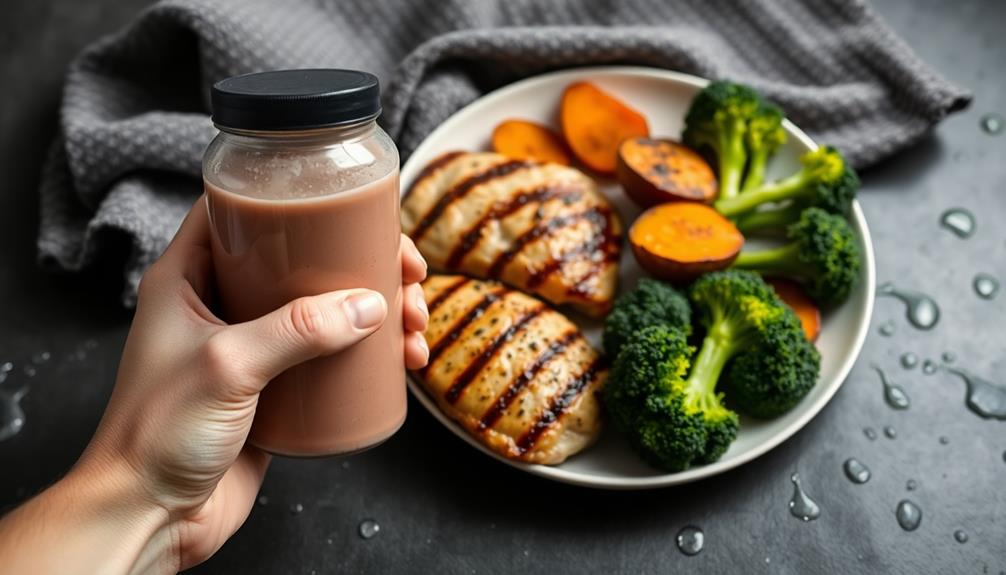
After a workout, you have a choice between liquid and solid foods for recovery. Liquid foods like protein shakes and smoothies are digested and absorbed quickly. This makes them a good choice right after exercise. They're also easy to drink if you're not very hungry.
Protein bars are a solid option that give you protein, carbs, and fat in one package. They come in many flavors. Bars work well for athletes who need more protein. They're also handy for a quick snack on the go.
Solid foods have benefits too. They release energy slowly and keep you feeling full longer. Whole foods also have extra vitamins and minerals that liquid supplements might not.
The best choice depends on your workout, when you'll eat your next meal, and what you like. You could try having a liquid right after exercise. Then eat a solid meal 1-2 hours later. This combo approach often works well.
Tailoring Intake to Fitness Goals

After your workout, you need to adjust your food intake based on your fitness goals. If you want to build muscle, eat more protein compared to someone training for endurance. For gaining muscle, eat carbs and protein in a 2:1 ratio. Endurance athletes should aim for a 3:1 or 4:1 carb-to-protein ratio. If you're trying to lose weight, focus on lean proteins and limit your carb intake. To recover well, think about adding fast-acting carbs to your post-workout meal. They can quickly refill your energy stores.
Keep these things in mind when planning your post-workout food:
- Your body type and current fitness level
- How hard and long your workout was
- The total calories and macronutrients you need each day
Common Post-Workout Nutrition Mistakes

Many people make nutrition mistakes after working out that can slow their progress, even though they have good intentions. Common post-workout nutrition mistakes include:
| Mistake | Consequence | Solution |
|---|---|---|
| Skipping meals | Slower recovery | Eat within 30 minutes |
| Overeating | Gaining weight | Control portions |
| Not drinking enough water | Feeling tired, getting cramps | Drink water regularly |
| Not eating carbs | Having low energy | Eat complex carbs |
You might want to skip your post-workout meal, thinking it'll help you lose weight. But this can make your recovery and muscle growth slower. On the other hand, eating too much after a workout can cause you to gain weight when you don't want to. It's important to find the right balance and timing for your post-workout meal. Make sure to drink enough water and include both protein and carbs in your meal. This will help your body recover and give you back the energy you used.
Practical Post-Workout Meal Ideas
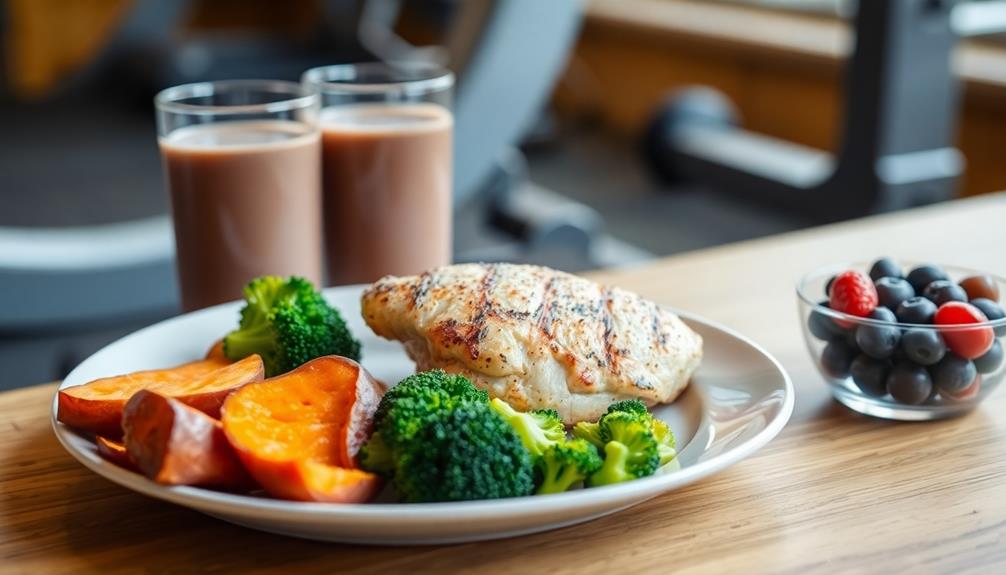
Planning post-workout meals is simple. Combine protein and carbs to refuel and rebuild muscle. Try these easy ideas:
- Greek yogurt with berries and granola
- Turkey and avocado sandwich on whole grain bread
- Protein shake with banana and oats
Protein bars are great for a quick, portable snack after exercise. They have a good balance of nutrients. Drink plenty of water or an electrolyte beverage too. Keep things like hard-boiled eggs, protein bars, or fruit with nut butter ready to go when you're busy. Eat the right amount for how hard your workout was and what your body needs. With a little planning, you can easily fuel up right after a workout.
Frequently Asked Questions
Can Pre-Workout Nutrition Affect Post-Workout Protein and Carb Requirements?
Yes, your pre-workout nutrition can impact post-workout needs. If you've consumed adequate protein and carbs beforehand, you might require less afterward. However, you'll still need some post-workout nutrition to support recovery and muscle growth.
How Does Age Impact Optimal Post-Workout Protein and Carbohydrate Intake?
As you age, you'll need more protein to support muscle recovery and growth. You'll also require fewer carbs post-workout due to decreased insulin sensitivity. Adjust your intake accordingly, focusing on high-quality protein sources and complex carbohydrates.
Are There Any Supplements That Enhance Protein and Carbohydrate Absorption Post-Workout?
You'll find several supplements that can boost protein and carb absorption post-workout. Consider using digestive enzymes, probiotics, or alpha-lipoic acid. Creatine and betaine may also help enhance nutrient uptake and muscle recovery after exercise.
Does the Type of Exercise Affect Ideal Post-Workout Protein-To-Carb Ratios?
Yes, your exercise type affects ideal post-workout protein-to-carb ratios. For strength training, you'll need more protein, while endurance activities require more carbs. Adjust your intake based on your specific workout to optimize recovery and gains.
How Do Hormones Influence Post-Workout Protein and Carbohydrate Utilization?
Your hormones play an essential role in how you use protein and carbs after exercise. Insulin helps your muscles absorb nutrients, while cortisol can break down tissue. Growth hormone and testosterone promote muscle protein synthesis and recovery.

